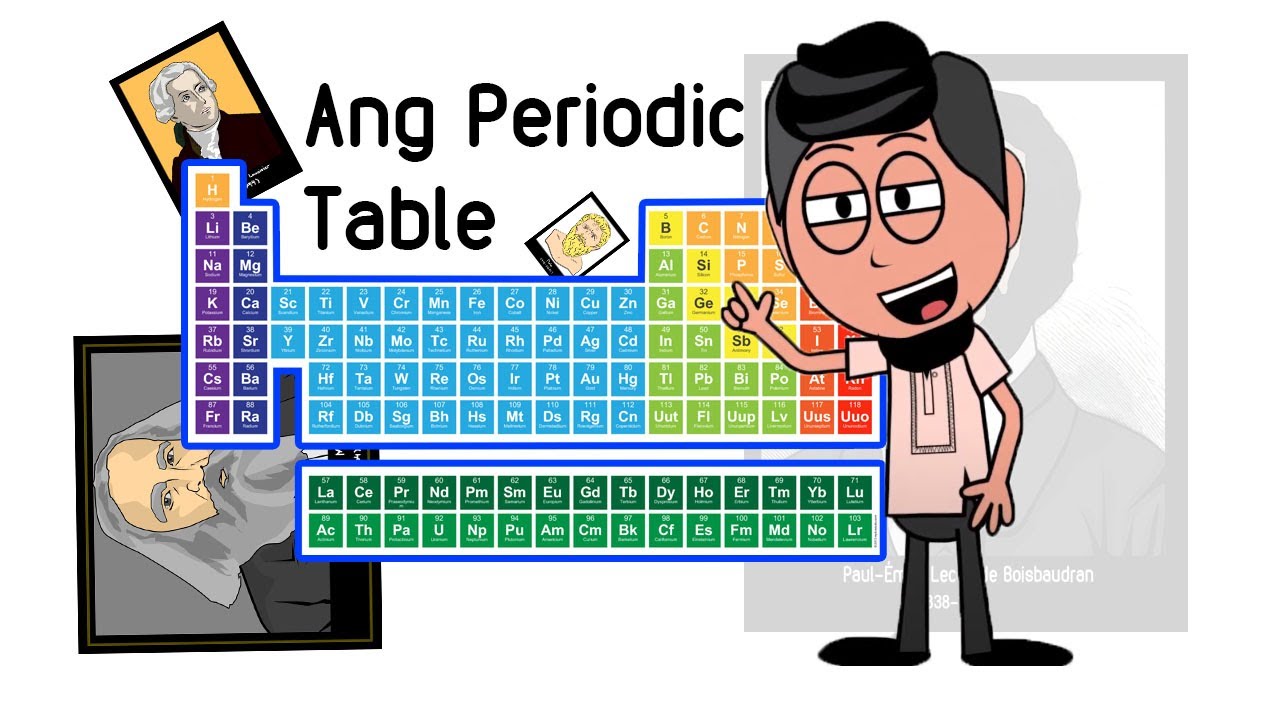A short history of the periodic table
Summary
TLDRProfessor Davis from the 'Chem Survival' YouTube channel revisits the history of the periodic table, starting with ancient Greek philosophers' theories of the four elements. The narrative advances to Antoine Lavoisier's identification of actual elements and culminates with Dmitri Mendeleev's innovative periodic table arrangement. Mendeleev's method, based on atomic mass and repeating properties, not only organized elements but also predicted undiscovered ones, laying the foundation for the modern periodic table.
Takeaways
- 😀 Professor Davis is returning to his YouTube channel after focusing on a project with the Great Courses, which is set to go on sale in fall 2016.
- 📚 The script provides an updated history of the periodic table video, a significant topic in the field of chemistry.
- 🌊 Thales, a Greek philosopher, originally proposed that all matter was made of water, which was later expanded to include air, earth, and fire by Empedocles.
- 🔍 Aristotle attempted to categorize these elements based on properties like hot or cold and wet or dry, creating an early form of a table for elements.
- 🔬 Antoine Lavoisier is credited with challenging the four-element theory and correctly identifying several elements, such as hydrogen, oxygen, and nitrogen.
- 🧪 Lavoisier's work laid the foundation for the modern understanding of elements, emphasizing the importance of chemical decomposition in their identification.
- 📊 Dmitri Mendeleev is recognized for creating the modern periodic table by arranging elements by increasing atomic mass and observing patterns in their properties.
- 🔮 Mendeleev's periodic table not only organized known elements but also predicted the existence of elements that were yet to be discovered.
- 🌐 The script highlights the evolution of the periodic table from ancient Greece to the modern era, showing a continuous development in the understanding of elements.
- 🔄 The modern periodic table is based on atomic number rather than atomic mass and has expanded to include newly discovered elements.
- 📈 The ongoing identification and characterization of elements demonstrate the dynamic nature of chemistry and its continuous advancement.
Q & A
What was the reason for the slow activity on Professor Davis' YouTube channel?
-Professor Davis was focusing on another project with the Great Courses, which was in production and is now ready for sale in fall 2016.
What is the significance of the periodic table in the history of science?
-The periodic table is one of the most iconic images in all of science, representing the organization of the elements based on their properties.
What was the initial belief about the composition of all matter according to Thales?
-Thales, a Greek philosopher, believed that all matter in the universe was made of just one base substance, which he identified as water.
How did Thales attempt to explain the diversity of materials if everything is made of water?
-Thales suggested that water could take on varying states such as botanical, physiological, meteorological, and geological, and that these states in combination could explain the diversity of materials.
What was Empedocles' contribution to the theory of elements?
-Empedocles postulated that there were four elements: water, air, earth, and fire, and that these fundamental substances combined in various ratios to form all materials around us.
Who first proposed the term 'elements' for the fundamental substances?
-Plato was the first to propose that the fundamental substances be given the name 'elements'.
How did Aristotle categorize the four elements based on their properties?
-Aristotle categorized the elements by plotting their properties on two coordinates: one axis for hot or cold and another for wet or dry, creating a table where elements with similar properties fell into the same column or row.
Who is credited with challenging the idea that water, air, earth, and fire are elements?
-Antoine Lavoisier is credited with challenging this idea by demonstrating that water, air, and other substances could be broken down into simpler substances, proving they were not elemental.
What was the significance of Dmitri Mendeleev's approach to organizing the elements?
-Mendeleev organized the elements not in a simple list but in a grid, with elements having similar properties placed within a column, which allowed for a compact, information-rich table and even the prediction of yet-to-be-discovered elements.
How has the modern periodic table evolved from Mendeleev's original table?
-The modern periodic table has evolved to list elements in order of increasing atomic number, filling in the gaps from Mendeleev's table, but it is still based on his idea of tabulating elements based on their properties.
What is the current status of the periodic table as of the video script's recording?
-As of the recording, four new elements were set to make their appearance on the periodic table in 2016, continuing the process of identification, characterization, and cataloguing of elements.
Outlines

This section is available to paid users only. Please upgrade to access this part.
Upgrade NowMindmap

This section is available to paid users only. Please upgrade to access this part.
Upgrade NowKeywords

This section is available to paid users only. Please upgrade to access this part.
Upgrade NowHighlights

This section is available to paid users only. Please upgrade to access this part.
Upgrade NowTranscripts

This section is available to paid users only. Please upgrade to access this part.
Upgrade NowBrowse More Related Video
5.0 / 5 (0 votes)





